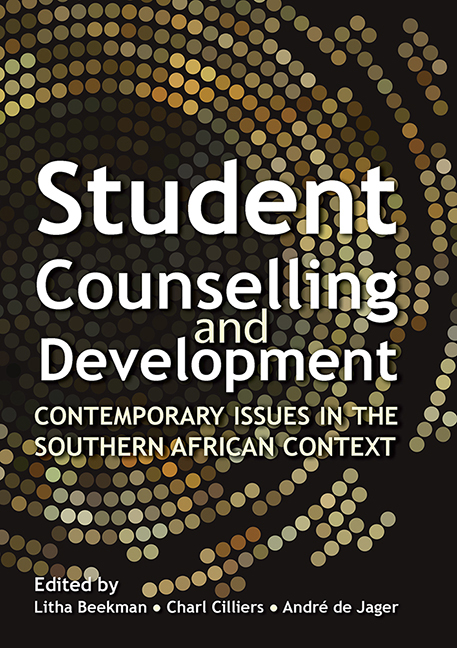Book contents
- Frontmatter
- Contents
- Figures
- Tables
- Preface
- Section 1 Development of Student Counselling and Development in Southern Africa
- Section 2 Theoretical Foundations of Student Counselling and Development in Higher Education
- Section 3 Services and Programmes Provided by Student Counselling and Development Units
- Section 4 Student Counselling and Development For Special Groups
- Section 5 Quality Assurance and Ethical and Professional Issues
- Contributors
- Index
Chapter 9 - Career Counselling and Development in Higher Education
Published online by Cambridge University Press: 22 February 2020
- Frontmatter
- Contents
- Figures
- Tables
- Preface
- Section 1 Development of Student Counselling and Development in Southern Africa
- Section 2 Theoretical Foundations of Student Counselling and Development in Higher Education
- Section 3 Services and Programmes Provided by Student Counselling and Development Units
- Section 4 Student Counselling and Development For Special Groups
- Section 5 Quality Assurance and Ethical and Professional Issues
- Contributors
- Index
Summary
INTRODUCTION
Career counselling and development at higher education (HE) institutions in South Africa, now, more than at any other time in history, must be dynamic and creative. It should provide career counselling that is, on the one hand, highly individualised to prepare students for life-long learning in an unpredictable and turbulent labour market, and on the other hand, focused on facilitating career development of the broader student community as a group of people going through a specific career development transition phase as they move from school through HE and into the world of work. Career counselling and development services at HE institutions have expanded from a centre-based service to the wider context of institution, stakeholder and industry to deliver an integrated service in a variety of ways. The focus of this chapter is on the conceptualisation and structure of career counselling and development within the changing context of HE, a multiracial, multilingual, multicultural, multigenerational, multinational student population, national and international world of work demands, and 21st century personal values and beliefs about work, study and life.
TRENDS IN CAREER THEORY DEVELOPMENT
Career and career guidance theories are interrelated and reflect perspectives and philosophical assumptions and provide parameters within which student counsellors can interpret and hypothesise about career behaviour, decisions and counselling. There has been a proliferation of career and guidance theories since the start of the last century (Watson & Stead, 2006) and an expansion of the theory and research base of career psychology since 1990, resulting in a convergence of ideas concerning career development and interventions to facilitate it. Some of the theories provide constructs which can be measured and are directly applicable to career counselling while others are theoretical models that include constructs that cannot be measured but can be applied by career counsellors (Schreuder & Coetzee, 2006). To set the stage for the rest of the chapter, a brief overview of the major theories, approaches and current developments in career counselling is presented to help student counsellors to relate career theory and research to the practice of counselling students.
Theories are developed from different philosophical orientations as well as different objectives (Osipow & Fitzgerald, 1996; Savickas, 1995).
- Type
- Chapter
- Information
- Student Counselling and DevelopmentContemporary issuesin the Southern African Context, pp. 171 - 193Publisher: University of South AfricaPrint publication year: 2012
- 1
- Cited by



